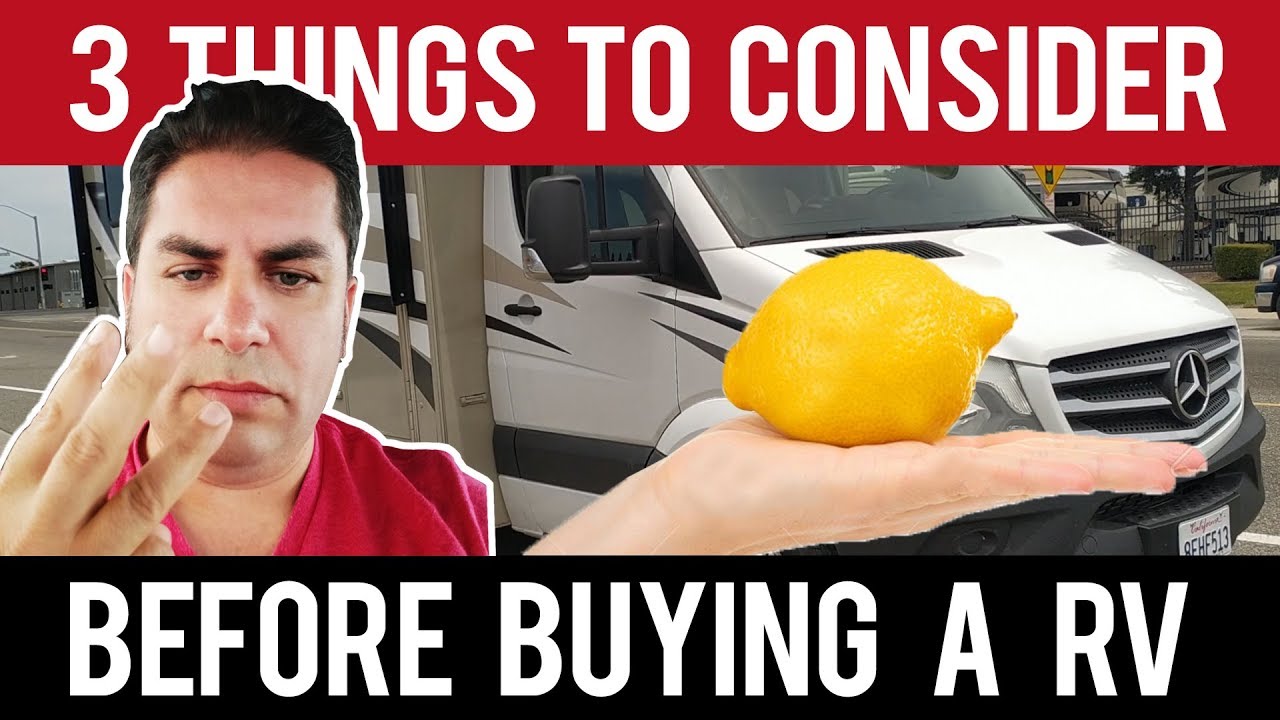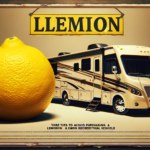When it comes to purchasing a recreational vehicle, you want to make sure you’re getting a reliable one that won’t turn out to be a lemon. In this video by RANDOMFIX, you’ll discover the top 3 tips to avoid getting stuck with a lemon RV. Before you head back to the dealership to return your lemon, learn what RV dealers may not want you to know.
Whether you’re a seasoned RV owner or a first-time buyer, understanding what to look for when buying an RV is crucial. Avoid the headache of dealing with a lemon RV by following these tips from RANDOMFIX. Don’t forget to show your support by adding to the tip jar, and consider subscribing for more helpful advice on avoiding lemon recreational vehicles.

Understanding Lemon RVs
When it comes to recreational vehicles (RVs), understanding what a lemon RV is can save you from a lot of headaches in the future. A lemon RV is a vehicle that has significant defects or issues that impair its functionality, safety, or value. These issues are unable to be repaired after a reasonable number of attempts, leading to continuous problems for the owner. Knowing the definition of a lemon RV is crucial before making a purchase to prevent getting stuck with a problematic vehicle.
Risks of purchasing a lemon RV
The risks of purchasing a lemon RV are substantial and can lead to financial loss, safety hazards, and constant frustration. Buying a lemon RV can result in repeated breakdowns, costly repairs, and even accidents on the road. It can also lead to a significant loss of resale value, making it challenging to recover your investment. Understanding the risks associated with lemon RVs is essential to make an informed decision when shopping for an RV.
Researching Before Purchase
Before committing to buying an RV, it’s crucial to do your research to avoid purchasing a lemon. Checking reviews and ratings of the RV brand you are interested in can provide valuable insights into the quality and reliability of the vehicle. Look for feedback from current owners to get a better understanding of what to expect. Additionally, inspecting the RV thoroughly before making a purchase can help identify any potential issues or red flags that may indicate a lemon RV.
Check reviews and ratings of the RV brand
Reading reviews and ratings of the RV brand you are considering can give you valuable information about the overall quality and performance of the vehicle. Look for common issues that other owners have experienced to determine if the RV is prone to problems. Positive reviews can also help you feel more confident in your decision to purchase a specific brand or model.
Inspect the RV thoroughly before buying
When inspecting an RV before purchase, pay close attention to details such as the condition of the interior and exterior, the functionality of appliances and systems, and signs of wear and tear. Look for any signs of water damage, leaks, or mold, as these can indicate underlying issues that may be costly to repair. Taking the time to inspect the RV thoroughly can save you from the headache of buying a lemon.
Tips for Avoiding Lemon RVs
To steer clear of lemon RVs, there are several precautions you can take to ensure you are making a sound investment. Buying from reliable dealerships that have a good reputation for selling quality RVs is a smart move. Ask for warranty and service records to verify that the RV has been well-maintained and to understand what coverage you have in case of any issues. Consider hiring a professional inspector to conduct a thorough examination of the RV before finalizing the purchase.
Buy from reliable dealerships only
Purchasing your RV from a reputable dealership with a history of selling reliable vehicles can reduce the risk of ending up with a lemon. These dealerships are more likely to stand behind their products, offer warranties, and provide service and maintenance records. Avoid buying from private sellers or dubious dealerships that may not disclose all relevant information about the RV.
Ask for warranty and service records
Before buying an RV, always ask for warranty and service records to verify that the vehicle has been properly maintained and serviced. These records can give you insight into the RV’s history, including any past repairs or issues that have been addressed. Having access to warranty information can also give you peace of mind knowing that you are protected in case of any unexpected problems.
Consider hiring a professional inspector
If you are uncertain about the condition of an RV or want an expert opinion before making a purchase, consider hiring a professional inspector. An RV inspector can thoroughly examine the vehicle, identify any hidden issues, and provide you with a detailed report outlining the RV’s overall condition. While hiring an inspector may come with an additional cost, it can save you from purchasing a lemon RV and encountering costly repairs down the line.
What RV Dealers Don’t Want You to Know
While RV dealers may try to make a sale, there are certain things they may not disclose to you when purchasing a vehicle. Being aware of these hidden issues can help you navigate the buying process more confidently and avoid falling victim to common pitfalls.
Hidden issues dealers may not disclose
Dealers may not always disclose all the information about an RV, such as previous accidents, major repairs, or other potential issues. It’s essential to ask probing questions and request a comprehensive vehicle history report to get a complete picture of the RV’s background. Understanding what dealers may not disclose can help you make a more informed decision when buying an RV.
Negotiation tips to get the best deal
RV dealers often have room for negotiation when it comes to pricing and terms of the sale. Don’t be afraid to negotiate for a better deal, especially if you have done your research and know the true value of the RV. Be prepared to walk away if the dealer is unwilling to meet your terms, as there are plenty of other options available. Negotiating with confidence can help you secure the best deal possible on your RV purchase.

Factors to Consider When Buying a Used RV
When buying a used RV, there are several key factors to keep in mind to avoid ending up with a lemon. Considering the age and mileage of the RV can give you valuable insights into its overall condition and potential longevity.
Age of the RV
The age of an RV is a crucial factor to consider when purchasing a used vehicle. Older RVs may have more wear and tear, outdated systems, and a higher likelihood of mechanical issues. While some older RVs may still be in good condition, it’s essential to thoroughly inspect the vehicle and consider any potential maintenance or repair costs associated with its age.
Mileage of the RV
The mileage of an RV can also provide valuable information about its usage and condition. Higher mileage RVs may have experienced more wear and tear on the engine, transmission, and other critical components. While lower mileage may indicate less use, it’s essential to look beyond the odometer reading and consider the overall maintenance and care the RV has received throughout its life.
Identifying Common Lemon RV Signs
Recognizing common signs of a lemon RV can help you avoid potential headaches and financial loss in the future. Being aware of red flags and warning signs can alert you to potential issues before making a purchase.
Frequent breakdowns or malfunctions
If an RV experiences frequent breakdowns or malfunctions, it may be a sign of underlying issues that could classify it as a lemon. Constant repairs and unexpected failures can indicate significant problems with the vehicle’s systems or components, making it unreliable and unsafe for regular use. Pay attention to any recurring issues or malfunctions when shopping for an RV.
Unexplained odors or leaks
Unexplained odors or leaks inside an RV can be indicative of water damage, mold, or other hidden issues. Musty or foul smells, dampness, or visible leaks are red flags that something may be wrong with the RV. These issues can be challenging and costly to repair, so it’s crucial to address them before finalizing a purchase to prevent investing in a lemon RV.

Dealing with a Lemon RV
If you find yourself in possession of a lemon RV, understanding your rights and options can help you navigate the situation effectively. Familiarize yourself with lemon laws for RVs in your state and seek legal advice if necessary to protect your interests.
Understanding lemon laws for RVs
Lemon laws vary by state and provide recourse for consumers who end up with defective vehicles. These laws typically require the manufacturer to repair or replace a lemon RV if it cannot be fixed after a reasonable number of repair attempts. Understanding the lemon laws in your state can help you seek appropriate action if you find yourself in possession of a lemon RV.
Seeking legal advice if necessary
If you believe you have purchased a lemon RV and are unsure how to proceed, seeking legal advice can help protect your rights and interests. An attorney experienced in lemon law cases can advise you on the best course of action and help you navigate the legal process to seek a resolution. Don’t hesitate to reach out for assistance if you feel that you have been sold a lemon RV.
Supporting Resources for Lemon RV Buyers
For RV buyers looking to avoid purchasing a lemon, there are several resources available to help educate and support you in your buying journey. Online forums and communities for RV enthusiasts can provide valuable insights, tips, and advice from experienced owners.
Online forums and communities for RV enthusiasts
Engaging with online forums and communities dedicated to RVs can be a great way to connect with fellow enthusiasts and gain valuable knowledge about different models, brands, and common issues to watch out for. These communities often share personal experiences, recommendations, and resources to help new RV buyers make informed decisions and avoid common pitfalls.
RV inspection checklist templates
Using RV inspection checklist templates can be a helpful tool when examining an RV before purchase. These checklists outline key areas to inspect, common issues to look for, and questions to ask the seller or dealer. By following a comprehensive inspection checklist, you can ensure that you are thorough in your evaluation of the RV and better equipped to spot potential red flags.

Benefiting from Lemon RV Experiences
While experiencing a lemon RV can be frustrating and challenging, there are opportunities to learn and grow from the situation. By understanding the mistakes of others and turning a lemon RV experience into a positive learning opportunity, you can emerge stronger and more informed.
Learning from mistakes of others
Learning from the experiences of others who have dealt with lemon RVs can help you avoid making similar errors and better navigate the buying process. Take the time to research common issues, read personal stories, and seek advice from those who have been through similar situations. By learning from the mistakes of others, you can make smarter decisions and protect yourself from potential pitfalls.
Turning a lemon RV situation into a positive learning experience
Instead of viewing a lemon RV as a negative experience, consider it an opportunity to learn and grow as an RV owner. Use the challenges you face with a lemon RV to educate yourself, improve your decision-making process, and become a more informed buyer in the future. By turning a lemon RV situation into a positive learning experience, you can emerge more resilient and confident in your ability to purchase a reliable vehicle.
Conclusion
In conclusion, understanding lemon RVs and how to avoid purchasing one is crucial for any RV buyer. By researching before purchase, following tips for avoiding lemon RVs, and being aware of common signs of a lemon RV, you can make a more informed decision when shopping for an RV. Remember to consider factors such as the age and mileage of the RV, seek supporting resources, and be prepared to deal with a lemon RV if necessary. Stay vigilant, informed, and use the knowledge gained from this article to make smart and confident choices when buying an RV. Happy RV hunting!





